| Srl | Item |
| 1 |
ID:
106117
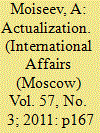

|
|
|
| 2 |
ID:
082931


|
|
|
|
|
| Publication |
2008.
|
| Summary/Abstract |
This paper critically examines the different ways that analysts and policy-makers have assessed the future shape of the Cuban regime following the future passing of its long-time revolutionary leader, Fidel Castro. Certainly, from a social science perspective, the future of Cuba after Fidel Castro is open. On the other hand, different, often mutually inconsistent scenarios for regime transition suggest that Cuba's future is over-determined. Both features of social reality - openness and over-determination - create space for visions, ideologies, strategies, and other normative interventions designed to impose a particular cognitive and political order on social reality. While social science should try to include such 'subjective factors' in its objective account, it must maintain a critical distance from the normative closure and hopeful predictions that ideologies and strategies of necessity imply. Based on an analytical distinction between relatively stable systems and rapidly changing systems, this paper identifies and goes on to discuss the major systems of primary relevance for Cuba's future.
|
|
|
|
|
|
|
|
|
|
|
|
|
|
|
|
| 3 |
ID:
080839
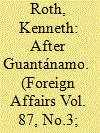

|
|
|
|
|
| Publication |
2008.
|
| Summary/Abstract |
The U.S. detention facility at Guantánamo Bay has become a stain on the United States' reputation. Shutting it down will cause new problems. Rather than hold terrorism suspects in preventive detention, the United States should turn them over to its criminal justice system
|
|
|
|
|
|
|
|
|
|
|
|
|
|
|
|
| 4 |
ID:
138683


|
|
|
| 5 |
ID:
140574


|
|
|
|
|
| Summary/Abstract |
VICTORY! Very much like in 1945 this proud word resounded all over the world and was heard in Europe, Asia, America, and Oceania at peace marches, antiwar demonstrations and pickets, international forums and scientific conferences. Political and public figures, academics from various countries deemed it necessary to remind mankind that it had paid dearly for the right to live and that the Soviet Union which had made the greatest contribution to the rout of Hitler Germany paid an inconceivably high price for the victory.
|
|
|
|
|
|
|
|
|
|
|
|
|
|
|
|
| 6 |
ID:
127712
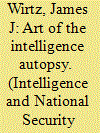

|
|
|
|
|
| Publication |
2014.
|
| Summary/Abstract |
Although intelligence postmortems are a common practice in the aftermath of intelligence failure, little is known about how they are conducted. This article explores the methodology employed by Robert Jervis in intelligence postmortems that followed the fall of the Shah of Iran in 1979 and the formulation of the 2002 Iraq national intelligence estimate that warned of the possibility that Iraq had restarted its nuclear program. The analysis reveals the challenges faced by scholars as they attempt to assess why analysts failed to offer accurate estimates and the way contemporary international relations theory can be applied to the realm of policy. The findings of the postmortems also shed light on areas where additional collaboration among scholars and analysts can advance the art of intelligence analysis.
|
|
|
|
|
|
|
|
|
|
|
|
|
|
|
|
| 7 |
ID:
087516
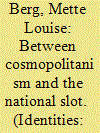

|
|
|
|
|
| Publication |
2009.
|
| Summary/Abstract |
Although cosmopolitanism used to be associated with Western, elite practices, it has in recent years been used to describe a wider array of practices by non-elite and non-Western groups. This article explores the cosmopolitanism of Cuba's "children of the revolution" living in Spain. They are those now young adults who were born in Cuba after the revolution and who were brought up to become the socialist New Man. Theirs was a world of socialist cosmopolitanism, which simultaneously was infused with commitment to a national, territorially-based political project: an independent, socialist Cuba. However, some of these New Men and New Women now embrace ideals of cosmopolitan individualism rather than the patriotic socialism with which they were inculcated as children. Yet the cultural tools that the children of the revolution make use of in their practices and narratives of cosmopolitanism paradoxically point back to revolutionary Cuba. The article argues that cosmopolitanism as a lived practice owes to experiences within the Cuban socialist-national project and is in effect a response to the ineffectiveness of this project, not necessarily a substantive opposition to it. Social capital and habitus deriving from Cuban socialism gave the children of the revolution the desire to attain cosmopolitanism as part of their life-projects. This finding suggests that the relationship between nationalism and cosmopolitanism needs further rethinking.
|
|
|
|
|
|
|
|
|
|
|
|
|
|
|
|
| 8 |
ID:
180869


|
|
|
| 9 |
ID:
152463


|
|
|
|
|
| Summary/Abstract |
In 1898, the United States government took possession of Cuba. Rather than annexation, the William McKinley Administration chose to create a new nation-state. Cuba’s fate therefore was unlike that of the Philippines, waiting until after the Second World War for independence. It leads to a question: when it came to Cuba, why the choice of creating a nation rather than annexation? The short answer is that the Cubans would have resisted annexation by force. The longer—and more interesting—answer is that annexation became unnecessary: Over time, Cuba’s nationalist elite proved willing to co-operate with American interests, and McKinley’s Administration left Cuba in nationalist hands, provided those hands were bound by the Platt Amendment. Historians have argued that Cuban nationalists co-operated because of coercion. Whilst true, Cuba’s nationalists also saw value in a relationship with the United States. Therefore, Cuba’s new leaders resisted American demands in ways not only to preserve the good opinion of Washington, but to prove themselves capable of civilised self-government.
|
|
|
|
|
|
|
|
|
|
|
|
|
|
|
|
| 10 |
ID:
129896


|
|
|
| 11 |
ID:
079108
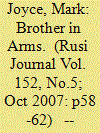

|
|
|
| 12 |
ID:
148267
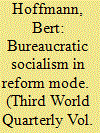

|
|
|
|
|
| Summary/Abstract |
Standard wisdom explains Cuba’s current transformation as one of economic change but political immobility. However, Cuban politics have also undergone a major change since the handing over of power from Fidel to Raúl Castro – even if the rhetoric used has been one of continuity. This article traces this process by looking at four areas: the depersonalisation and re-institutionalisation of the political structures; the diversification of the public sphere, particularly through the use of digital media; the liberalisation of travel and migration, with its transformative impact on state–citizen relations; and the turn to a moderate foreign policy, as highlighted by the rapprochement with the USA, with its implications for legitimising the underpinnings of Cuban socialism. Although the shift has been well below the threshold of a transition to multiparty democracy, Cuba has evolved from the charismatic model of the past to what can be understood as bureaucratic socialism in reform mode.
|
|
|
|
|
|
|
|
|
|
|
|
|
|
|
|
| 13 |
ID:
090539


|
|
|
|
|
| Publication |
2009.
|
| Summary/Abstract |
The history of Cuba was imbued with a sense of purpose at its inception. To have discerned the need at all for a history of Cuba in the nineteenth century was itself product and portent of a momentous shift in consciousness, an occasion when narratives of the past revealed themselves as a potential source of national community. The history of Cuba began at the moment that the past became relevant to the future. Historical narrative developed as a matter of necessity, a product of a time and place, a means by which Cubans addressed the needs of their times. Purpose and point of view were inscribed into the very premise of the historical narrative, and indeed fixed the narrative genre around which the history of Cuba was structured. The historical narrative in this instance contained a premonition of nation which shared something with the new collective consciousness to which it contributed. Historical consciousness was itself a product of national formation, to which it responded and for which it was summoned: the proposition of a shared awareness of a common past with which to bring a people together and justify a nation apart.
|
|
|
|
|
|
|
|
|
|
|
|
|
|
|
|
| 14 |
ID:
121214
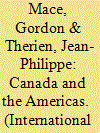

|
|
|
|
|
| Publication |
2012.
|
| Summary/Abstract |
Canada's minister of state for the Americas and consular affairs, Diane
Ablonczy, opened the December 2011 ministerial dialogue on the Americas
with the questions, "How is Canada doing in the Americas? How can we
do better?"1
The contributions to this special issue of International Journal
propose to frame some answers to these questions.
|
|
|
|
|
|
|
|
|
|
|
|
|
|
|
|
| 15 |
ID:
166668
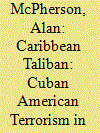

|
|
|
|
|
| Summary/Abstract |
Most scholars have not taken Cuban-American terrorism in the 1970s seriously, despite the unprecedented campaign of terror it unleashed. Borrowing a framework of self-identity usually applied to other terrorist groups and using case studies of the Cuban Nationalism Movement in New Jersey and of Alpha 66 in Florida, this article argues that Cuban-American political ideology was the key to its impact and its support from communities in Florida and New Jersey. Militant exiles saw themselves as betrayed by two enemy states, entitled to rule in their homeland, and imbued with a mission of civilizational renewal. In these ways, Cuban-American terrorists were similar to the Taliban in Afghanistan and their reign of terror in the 1970s should be appreciated as a major episode in the history of U.S. and global terrorism.
|
|
|
|
|
|
|
|
|
|
|
|
|
|
|
|
| 16 |
ID:
132032
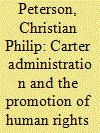

|
|
|
|
|
| Publication |
2014.
|
| Summary/Abstract |
This article will examine the effectiveness of the Carter administration's efforts to promote human rights in the Soviet Union. It will pay particular attention to how human rights promotion fit into a larger approach to transforming Superpower relations in ways favorable to U.S. interests called "reciprocal accommodation [détente]." The use of this framework provides an excellent way to tease out the complexities of how the administration balanced the promotion of human rights in the USSR with other important objectives such as concluding the SALT II treaty. It also helps reveal how executive branch worked to reduce Soviet human rights violations by citing the provisions of the Final Act and working with private citizens to raise international awareness about human rights issues. Without losing sight of his administration's inability to protect Soviet dissenters from arrest and harassment, this article will demonstrate that Carter had every intention of making the issue of human rights an important element of Cold War competition and implementing a new approach to détente that at least in part aimed at transforming Soviet internal behavior.
|
|
|
|
|
|
|
|
|
|
|
|
|
|
|
|
| 17 |
ID:
078755
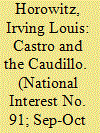

|
|
|
| 18 |
ID:
051878
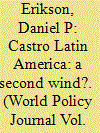

|
|
|
| 19 |
ID:
015774


|
|
|
|
|
| Publication |
Spring 1992.
|
| Description |
329-347
|
|
|
|
|
|
|
|
|
|
|
|
|
|
|
|
| 20 |
ID:
010512
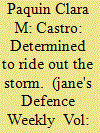

|
|
|
|
|
| Publication |
April 3, 1996.
|
| Description |
20-22
|
|
|
|
|
|
|
|
|
|
|
|
|
|
|
|